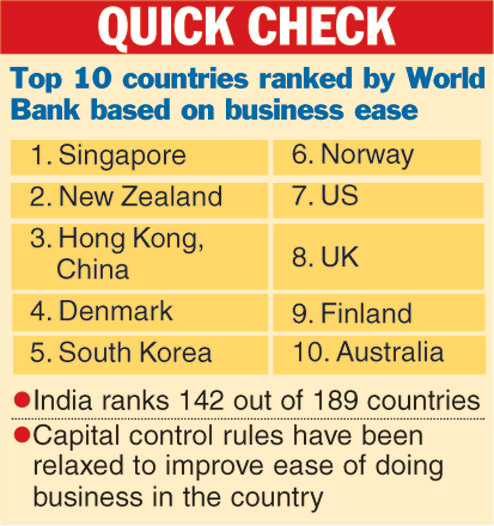
New Delhi, May 19: The government has relaxed controls over capital account transactions by usurping the powers of the Reserve Bank to prohibit, restrict or regulate money flows into and out of the country.
The change is a result of an amendment of section 6 of the Foreign Exchange Management Act (FEMA), which was introduced in the Finance Act of 2015.
The government has omitted sub-section 3 of Section 6 in FEMA under which the RBI could until April 1 regulate transfer or issue of securities to Indian and overseas residents, borrowing or lending in foreign exchange, borrowing or lending in rupees between a resident Indian and an overseas entity, transfer of immovable property outside India other than a five-year lease, and the grant of a guarantee or surety in respect of any debt, obligation or any other liability between a person resident in India and owed to a person outside India.
Effectively, it will now be the prerogative of the finance ministry to specify any class or classes of capital account transactions, not involving debt instruments, which are permissible.
It will also be able to decide the limit up to which foreign exchange shall be admissible for such transactions.
The amendment does say that the Centre may consult the RBI before making any notification in this respect, but it is not obliged to do so.
This implies that North Block will decide on the flow of foreign direct investment (FDI) and foreign portfolio investment (FPI) into the country.
Officials said the change in semantics is important as it means the Centre, if it so desires, can ease capital convertibility restrictions on FDIs and FPIs.
However, the RBI can as it could earlier, continue to specify any class or classes of capital account transactions, involving debt instruments, which are permissible and set the limit up to which foreign exchange would be allowed under those heads as well as place restrictions or ceilings on debt in consultation with the finance ministry.
Earlier rules and restrictions on FDI and FPI notified by the RBI will, however, continue to be in place till any changes are made by the Centre.
The RBI can also decide the definition of what constitutes foreign debt only in consultation with the central government.
The bill has also deleted Section 6 (3), which gave the central bank powers to prohibit, restrict or regulate transfer or issue of any foreign security by a person or firm resident in India.
Officials said these changes will allow them to take faster decisions on foreign investment proposals. The move was designed to improve India's standing in the World Bank's Ease of Doing Business rankings. India has been ranked at a lowly 142 out of 189 countries. The Modi government wants to propel the country into the Top 50.
However, the longer-term implications of the changes are being seen as another move towards full convertibility of the rupee.
The Indian currency is currently partially convertible. The rupee has been convertible on the current account since 1994, meaning it can be changed freely into foreign currency for purposes such as trade-related expenses. But it cannot be converted freely for activities such as acquiring overseas assets.
Last month, minister of state for finance Jayant Sinha said India should move towards full capital account convertibility.
"If we have to be among the top three-four economies in the world, we have to make it possible for our capital markets to be broader and deeper, and for that to happen capital account convertibility also becomes important," Sinha had said at a function here, without specifying any timeline.
RBI governor Raguram Rajan has also said in a few years India should move towards full convertibility. He had pointed out that "the only place today that we have some restrictions is inflows into debt, especially very short-term debt".










